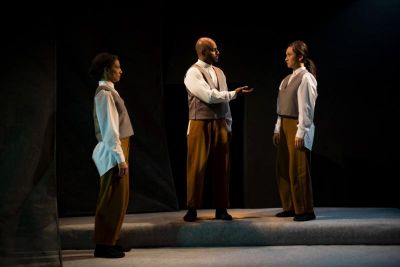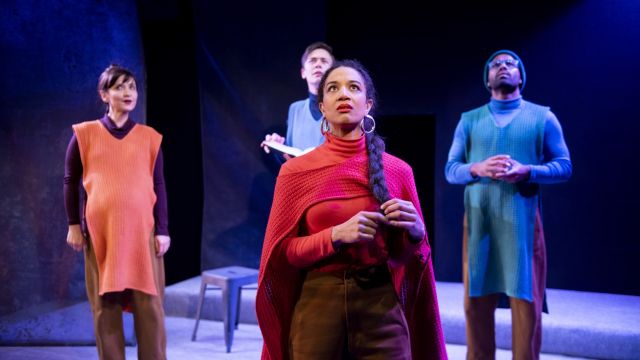Control
A comedy sci-fi satire in three parts, Control is about variations of ‘control’: being controlled, attempting to regain control, and losing control. In its way, it is reminiscent of Charlie Brooker and Annabel Jones’ Black Mirror television series in which the characters adopt and use technology, only to face unintended consequences when they find that they are trapped and the outcomes are not at all what was expected. One austere set, designed by Emily Collett serves for all three stories, with atmospheric light changes by Lisa Mibus.
In what we might call Part 1, four no doubt carefully selected young people - Elizabeth (Christina O’Neil), Andrew (Dushan Philips), Jake (Samuel Rowe) and Laura (Naomi Rukavina) - are on a spaceship, about to land on Mars! As well as being at the mercy of the spaceship’s technology itself – which of course none of them understand, let alone control – they are obliged to take part in a ‘reality’ television show, supposedly about themselves and their feelings after a seven-month journey and now on the brink of an amazing arrival. Just like any ‘reality’ show – which we all know are not ‘real’ at all – and in comic contrast to the amazing context, what the show’s unseen producer-controllers demand is clichés and banality. Each of the characters is censored and/or made to present predictable, non-threatening versions of themselves, or they’re directed (manipulated) into being a certain ‘type’ (hero, sex-bomb, etc) that will reassure the viewers back on Earth, about 60 million kilometres away, that all is well – and ‘normal’.
 In Part 2, set Thirty Years (I think) Later, Xavier (Mr Rowe), a whiny, pathetic figure, tries to get certain embarrassing data deleted at the Museum of Childhood Memories (slogan ‘We Look After Your Memories So You Don’t Have To’) – which, of course, reminds us in passing of Eternal Sunshine of the Spotless Mind (Michel Gondry 2004) - but here Xavier is not in control. In other words, even our memories have been taken over and are controlled by technology and some all-powerful corporation. Meanwhile Caroline (Ms Rukavina) works out how to ‘control’ a partially programmed grumpy and uncoordinated cyborg Alex (Mr Philips); she and Nikki (Ms O’Neil) ask it questions it can’t answer, make it do ridiculous dance moves until it falls over. The irony underlying their childish glee suggests that , in this future, this is about the only ‘control’ they can achieve.
In Part 2, set Thirty Years (I think) Later, Xavier (Mr Rowe), a whiny, pathetic figure, tries to get certain embarrassing data deleted at the Museum of Childhood Memories (slogan ‘We Look After Your Memories So You Don’t Have To’) – which, of course, reminds us in passing of Eternal Sunshine of the Spotless Mind (Michel Gondry 2004) - but here Xavier is not in control. In other words, even our memories have been taken over and are controlled by technology and some all-powerful corporation. Meanwhile Caroline (Ms Rukavina) works out how to ‘control’ a partially programmed grumpy and uncoordinated cyborg Alex (Mr Philips); she and Nikki (Ms O’Neil) ask it questions it can’t answer, make it do ridiculous dance moves until it falls over. The irony underlying their childish glee suggests that , in this future, this is about the only ‘control’ they can achieve.
Part 3, set more aeons later, sees an increasingly uncertain and flustered Isabelle (Ms O’Neil) attempting to program a very advanced cyborg Esta (Ms Rukavina) to become a children’s teacher. But where does what the cyborg needs for its assigned role or task end? And what else might it learn that makes it superior to its programmer? This is the most successful of the three parts: it’s less of a sketch, the overt comedy is restrained, it is psychologically acute and performed with meticulous detail. Both actors are brilliant here. The programmer, Isabelle, becomes a rounded character such that we begin to wonder about her life when she is off duty, so to speak. Because she becomes a character, the increasing dominance of the cyborg becomes eerie and, as in the paradox of monster movies, we identify with the underdog cyborg! Here, perhaps, is a play in embryo.
 Unfortunately, writer, director Julian Meyrick and cast appear to’ve had rather too much fun with this and Part 3 repeats itself and runs longer than it should. We get the point, it’s intriguing, it works – up to a point – but one could feel the audience getting restless, anticipating ‘the end’ more than once – that or more definite pay-off.
Unfortunately, writer, director Julian Meyrick and cast appear to’ve had rather too much fun with this and Part 3 repeats itself and runs longer than it should. We get the point, it’s intriguing, it works – up to a point – but one could feel the audience getting restless, anticipating ‘the end’ more than once – that or more definite pay-off.
As is to be expected at Red Stitch, all the performances are excellent and our pleasure in that makes up for the rather derivative text. The problem with Control is that it is underdeveloped; it doesn’t go anywhere and leaves us with nothing much to take away. It feels rather self-satisfied. It is certainly ‘funny’ – very funny initially – but what it presents are three situations rather than three stories, and really none of them, even the intriguing Part 3, tells us anything we didn’t know or haven’t seen before. What’s missing is some answer to the questions, ‘And?’ Or ‘So?’ After two Red Stitch triumphs – Pomona and Ulster American – Control is a bit disappointing.
Michael Brindley
Photographer: Jodie Hutchinson
Subscribe to our E-Newsletter, buy our latest print edition or find a Performing Arts book at Book Nook.

